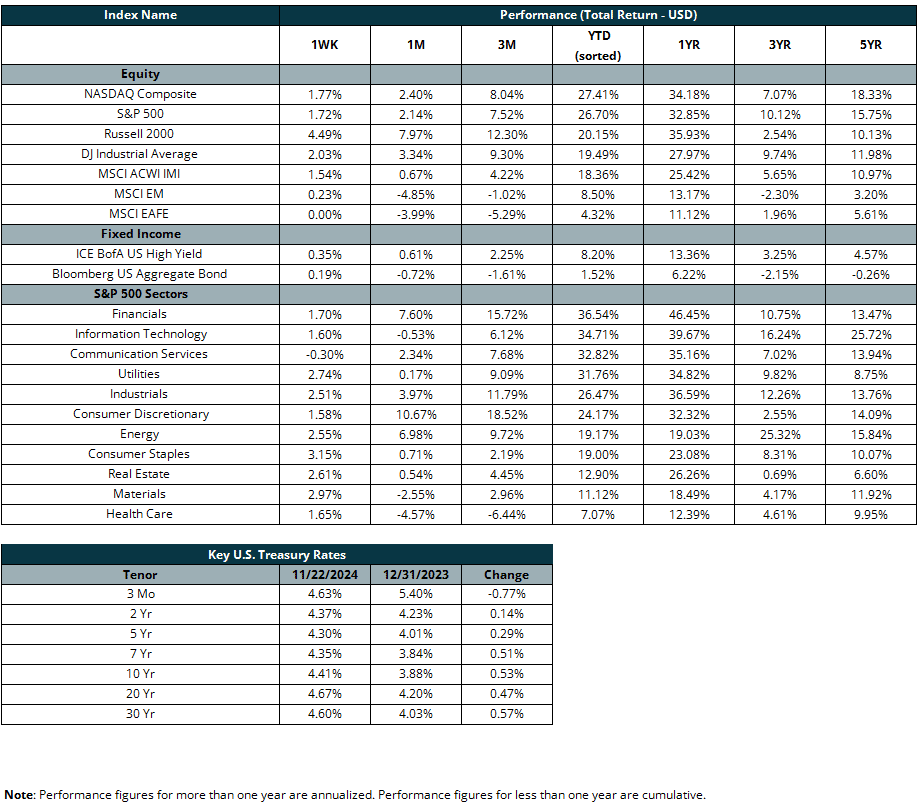Market Rotation Pushes Small Caps Higher

by Sequoia Financial Group

by Sequoia Financial Group
The presidential election was three weeks ago, but it’s still having a major impact on the financial markets. Stocks rallied in the immediate aftermath of the results, pulled back a week later, then rallied higher once again. The back-and-forth has been driven in part by investors sifting through the markets to determine the ultimate winners and losers of potential Trump policies. For example, dental supply company Henry Schein initially slumped along with other health-care stocks following the Trump win. But the stock rallied 9% last week on potential Health and Human Services secretary Robert F. Kennedy Jr.’s anti-fluoride stance. Less fluoride could possibly lead to more cavities for the public and more revenue for Henry Schein.[1]
Small-cap stocks experienced a similar rebound last week, though not quite to the same degree. The Russell 2000 Index jumped 4.5%, more than twice the gain posted by the S&P 500 and the NASDAQ.[2] Small caps are seen as a possible beneficiaries of Trump’s proposed tariffs, as they tend to be more domestically focused. Indeed, the Morningstar US Small Value Index earned an estimated 79% of its revenue domestically last year. In contrast, Morningstar’s Large-Cap Growth Index earned just 54% of its revenue from the US.[3]
Last week also saw the third-quarter earnings season largely come to a close, with Walmart, Target, and Nvidia reporting results. Nvidia delivered impressive growth, with revenue jumping 94% year over year. Market reaction was muted, but with the stock gaining nearly 200% since the first of the year, shareholders don’t have much to complain about.[4] Walmart and Target could have been expected to deliver similar results, given their competitive positioning. However, Walmart soared while Target sunk. Walmart won market share and comparable sales jumped 5%. Operating margins also improved, as did membership fee income from Sam’s Club. Meanwhile, Target’s comparable sales grew just 0.3%, and earnings and revenue fell short of expectations.[5]
We’re heading into a holiday-shortened market week, but one that historically tends to be quite bullish. Over the past 50 years, the S&P 500 has delivered a positive Thanksgiving-week return 70% of the time. In contrast, that number is closer to 56% for other weeks. And on average, the Index has gained 0.64% for Thanksgiving week, while in other weeks the Index has gained an average of just 0.17%.[6] But even if the trend doesn’t hold, the financial markets have already given investors much to be thankful for in 2024.
Happy Thanksgiving from all of us at Sequoia!

[1] https://www.cnbc.com/2024/11/18/dental-supply-stock-rallies-on-theory-rfks-anti-fluoride-stance-will-prompt-more-dentist-visits.html
[2] https://www.cnbc.com/2024/11/21/stock-market-today-live-updates.html
[3] https://www.morningstar.com/markets/this-unloved-asset-class-looks-attractive-regardless-election-results
[4] https://www.cnbc.com/2024/11/20/nvidia-nvda-earnings-report-q3-2025.html
[5] https://www.cnbc.com/2024/11/20/walmart-wmt-and-target-tgt-earnings-show-mixed-performance.html
[6] https://finance.yahoo.com/news/options-traders-play-thanksgiving-week-232432232.html
The views expressed represent the opinion of Sequoia Financial Group. The views are subject to change and are not intended as a forecast or guarantee of future results. This material is for informational purposes only. It does not constitute investment advice and is not intended as an endorsement of any specific investment. Stated information is derived from proprietary and nonproprietary sources that have not been independently verified for accuracy or completeness. While Sequoia believes the information to be accurate and reliable, we do not claim or have responsibility for its completeness, accuracy, or reliability. Statements of future expectations, estimates, projections, and other forward-looking statements are based on available information and Sequoia’s view as of the time of these statements. Accordingly, such statements are inherently speculative as they are based on assumptions that may involve known and unknown risks and uncertainties. Actual results, performance or events may differ materially from those expressed or implied in such statements. Investing in equity securities involves risks, including the potential loss of principal. While equities may offer the potential for greater long-term growth than most debt securities, they generally have higher volatility. Past performance is not an indication of future results. Investment advisory services offered through Sequoia Financial Advisors, LLC, an SEC Registered Investment Advisor. Registration as an investment advisor does not imply a certain level of skill or training.








Fed Chair Powell’s Tariff Talk Spooks Already-Nervous Markets